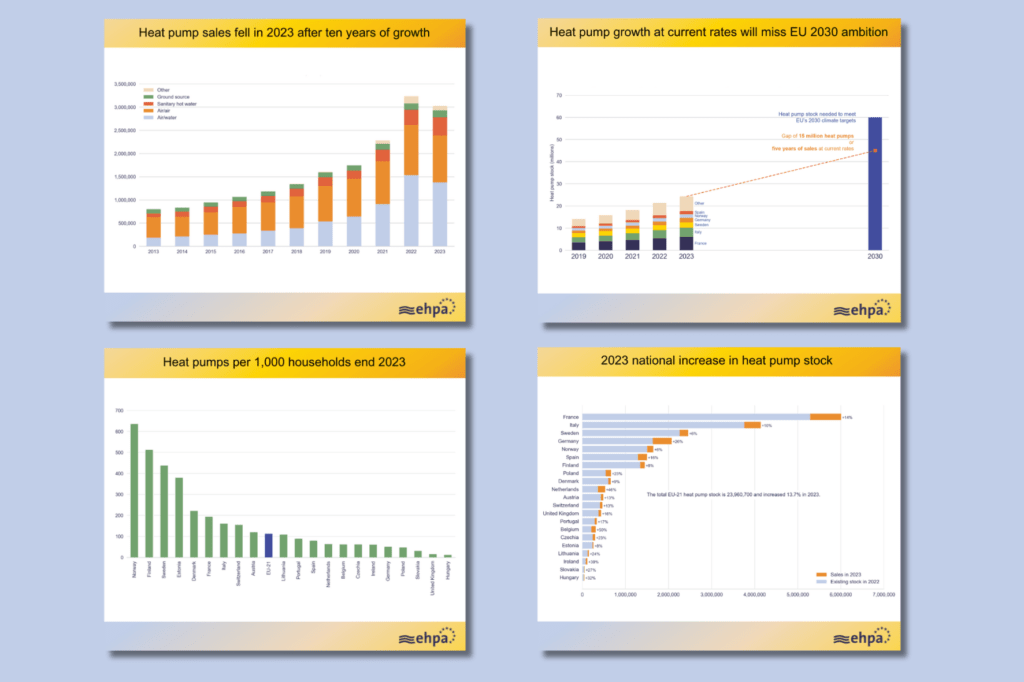The heating contribution to the EU’s 2030 climate targets will be missed by a significant amount if current trends in heat pump sales continue. This would be a blow to Europe’s clean tech leadership and competitiveness.
Data from 21 European countries*, gathered by the European Heat Pump Association, show that heat pump sales in 2023 were 6.5% lower than the previous year – the first fall after ten years of annual growth. The 3.02 million heat pumps sold in 2023 bring the total installed heat pumps in Europe’s buildings to 23.96 million – a 13.7% rise on 2022’s total.
If annual sales remain at this level (3 million a year), around 45 million heat pumps would be installed by 2030 – about 25% short of the EU’s aims**. This is the equivalent of five years of heat pump sales at current rates. The EU would miss out on potential investments and net zero industry growth. It would also be a missed opportunity to avoid emissions of about 70 Mt of CO2, roughly the annual CO2 output of Romania.

Mélanie Auvray, Policy Manager at the European Heat Pump Association said:
“With over 250 manufacturing sites in Europe, every heat pump sold and installed is a boost for Europe’s clean tech sector and its competitiveness. Ensuring we continue to grow the sector will help our energy independence as well as our path to a net zero economy. The delayed Heat Pump Action Plan is a crucial tool for stabilising the sector and tapping the benefits it offers. The new European Commission must publish it rapidly.”
Key reasons for the slow down are changing policies and support schemes. This can clearly be seen in contrasting examples like the Netherlands, where stable policies have boosted growth and Italy where a major change in the support scheme destabilised consumer confidence. Another key reason is gas prices becoming cheaper compared to electricity, where bills are often heavily taxed. Taxes and levies should be shifted away from electricity.

Comparatively, countries seeing the largest growth were Germany (161k additional heat pumps sold compared to 2022, +58.5%) Belgium (+43k, +72.2%) and the Netherlands (+50k, +43.4%). The greatest declines were experienced by Italy (a fall in sales of 298k heat pumps or -44.1%), Finland (-78k, -41.9%) and Poland (-78k, -38.8%).
In terms of the heat pump stock (meaning all installed heat pumps) per 1,000 households, Norway leads the way with 635, followed by Finland with 512 and Sweden with 438. At the other end are Hungary with 12 heat pumps per 1,000 households, the UK with 15 and Slovakia with 30.


Today, the European heat pump sector provides around 170,000 direct jobs and there is huge potential for growth. The heat pumps installed in Europe have avoided the emission of 58.4 Mt of CO2 over the past 20 years, 7.3 Mt last year.
Read the executive summary of the report:
More information:
EHPA has updated its methodology for calculating sales of air to air heat pumps to make it more accurate. This means there is a slight change to the numbers compared to previous releases. For a full explanation see here.
** The 21 countries are 18 EU members, plus Norway, Switzerland and the UK.
**The figure of 60 million heat pumps by 2030 is included in the European Commission’s impact assessment for the 2040 climate target (see chart 44).
The full heat pump market report from the European Heat Pump Association is available for members here.
It is also available for press members and policy-makers. Contact Sarah.Azau@ehpa.org Tel: +32 473 57 31 37.
For non-members, EHPA’s latest and previous market reports can be purchased here.




